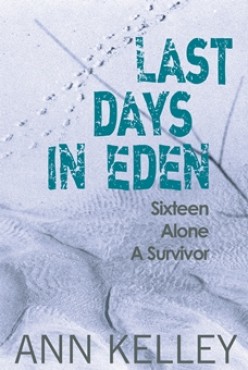Published by Luath Press Ltd
Review by Robbie Dhillon (Year 10 Norton Knatchbull School, Ashford)
In a post-apocalyptic world where humanity has been torn apart by oil wars and devastating fl oods, Last Days in Eden follows the story of sixteen year-old Flora Mandela, a survivor, spending her life selling goods at her home, Shell Shack, and hiding from the terrifying Uzi soldiers.
Nevertheless, this story is not how it may fi rst seem, for it is truly a tale in two halves. When the novel begins, Flora’s intense loneliness is almost palpable as we begin to see how her life has crumbled around her with the loss of her beloved grandparents.
Her only comfort is an illegal copy of Pride and Prejudice, the story of a large family from a simpler, bygone age and the type of life she longs for. Indeed, Ann Kelley’s attention to detail as Flora is swept along in the daily life at ‘the Hall’, is very reminiscent in style to Pride and Prejudice, although the slow speed of the fi rst half makes you wonder if the story will actually ever develop further.
The turning point in the novel however, is Flora’s realisation of the utter cruelty of the world that she thought she was longing to be part of: a world in which the lives of ‘povs’ and ‘skivs’ are so little valued that they are brutally hunted – this cruelty is made even more chilling when juxtaposed with the nonchalant attitude of the ‘Rice Lords’.
From that point onwards, Flora fi nds the strength to try and put things right and the rapid sequence of events adds an exciting climax to the end of the story. Whilst the book has many disturbing scenes, there is a sense of realism when we compare the underlying foundations of power to the present and history of our kind.
Overall, Last days in Eden is well worth reading to get your own take on the story.



